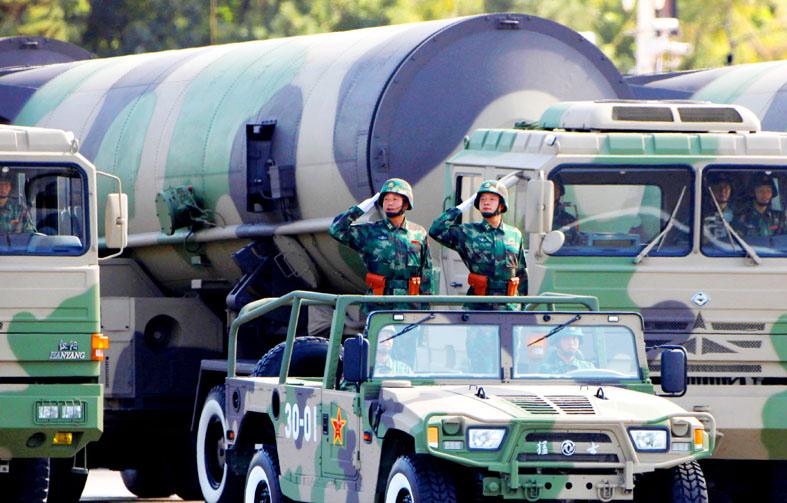China’s rapid buildup of its nuclear forces is concerning, the US said on Thursday, calling on Beijing to engage with it “on practical measures to reduce the risks of destabilizing arms races.”
The buildup had become more difficult for China to hide, and it appeared it was deviating from decades of nuclear strategy based around minimal deterrence, US Department of State spokesman Ned Price told a news briefing.
Price was responding to a question about a report in the Washington Post that said China had begun constructing more than 100 new missile silos in a desert area in the western part of the country.

Photo: Reuters
“These reports and other developments suggest that the PRC’s [People’s Republic of China’s] nuclear arsenal will grow more quickly, and to a higher level than perhaps previously anticipated,” Price said.
“This buildup is concerning. It raises questions about the PRC’s intent, and for us, it reinforces the importance of pursuing practical measures to reduce nuclear risks,” he said.
“We encourage Beijing to engage with us on practical measures to reduce the risks of destabilizing arms races — potentially destabilizing tensions,” he added.
This was why US President Joe Biden had prioritized strategic stability in his engagement with Russian President Vladimir Putin, Price said.
“The same rationale would apply to engagement with another nuclear power, the PRC,” he added.
Washington had “taken note” of remarks by Chinese President Xi Jinping (習近平) at a ceremony marking the 100th anniversary of the founding of the Chinese Communist Party on Thursday, but was “not going to comment on the specifics,” Price said.
In his address, Xi warned that foreign forces attempting to bully China would “get their heads bashed,” and pledged to build up its military. He also committed to the “reunification” of Taiwan and said that social stability would be ensured in Hong Kong, while protecting China’s security and sovereignty.
The Washington Post report cited commercial satellite images and analysis from the James Martin Center for Nonproliferation Studies in Monterey, California.
It said that the 119 nearly identical construction sites contained features that mirrored existing launch facilities for China’s existing arsenal of nuclear-tipped ballistic missiles.
In a report to Congress last year, the Pentagon estimated that China’s nuclear warhead stockpile was in “the low 200s,” and said it was projected to at least double in size as Beijing expands and modernizes its forces.
Analysts say the US has about 3,800 warheads, and according to a US Department of State factsheet, 1,357 of those were deployed as of March 1.
Washington has repeatedly called on China to join it and Russia in a new arms control treaty, and the US disarmament ambassador in May said that Beijing was resisting this despite a “dramatic” buildup in its arsenal.
Beijing says its arsenal is dwarfed by those of the US and Russia, and it is ready to conduct bilateral dialogue on strategic security “on the basis of equality and mutual respect.”
Nonproliferation experts said this year that China’s push to develop fuel for a new generation of nuclear power reactors would produce large amounts of materials that could be diverted to making nuclear weapons.

SECURITY: As China is ‘reshaping’ Hong Kong’s population, Taiwan must raise the eligibility threshold for applications from Hong Kongers, Chiu Chui-cheng said When Hong Kong and Macau citizens apply for residency in Taiwan, it would be under a new category that includes a “national security observation period,” Mainland Affairs Council (MAC) Minister Chiu Chui-cheng (邱垂正) said yesterday. President William Lai (賴清德) on March 13 announced 17 strategies to counter China’s aggression toward Taiwan, including incorporating national security considerations into the review process for residency applications from Hong Kong and Macau citizens. The situation in Hong Kong is constantly changing, Chiu said to media yesterday on the sidelines of the Taipei Technology Run hosted by the Taipei Neihu Technology Park Development Association. With

CARROT AND STICK: While unrelenting in its military threats, China attracted nearly 40,000 Taiwanese to over 400 business events last year Nearly 40,000 Taiwanese last year joined industry events in China, such as conferences and trade fairs, supported by the Chinese government, a study showed yesterday, as Beijing ramps up a charm offensive toward Taipei alongside military pressure. China has long taken a carrot-and-stick approach to Taiwan, threatening it with the prospect of military action while reaching out to those it believes are amenable to Beijing’s point of view. Taiwanese security officials are wary of what they see as Beijing’s influence campaigns to sway public opinion after Taipei and Beijing gradually resumed travel links halted by the COVID-19 pandemic, but the scale of

A US Marine Corps regiment equipped with Naval Strike Missiles (NSM) is set to participate in the upcoming Balikatan 25 exercise in the Luzon Strait, marking the system’s first-ever deployment in the Philippines. US and Philippine officials have separately confirmed that the Navy Marine Expeditionary Ship Interdiction System (NMESIS) — the mobile launch platform for the Naval Strike Missile — would take part in the joint exercise. The missiles are being deployed to “a strategic first island chain chokepoint” in the waters between Taiwan proper and the Philippines, US-based Naval News reported. “The Luzon Strait and Bashi Channel represent a critical access

Pope Francis is be laid to rest on Saturday after lying in state for three days in St Peter’s Basilica, where the faithful are expected to flock to pay their respects to history’s first Latin American pontiff. The cardinals met yesterday in the Vatican’s synod hall to chart the next steps before a conclave begins to choose Francis’ successor, as condolences poured in from around the world. According to current norms, the conclave must begin between May 5 and 10. The cardinals set the funeral for Saturday at 10am in St Peter’s Square, to be celebrated by the dean of the College